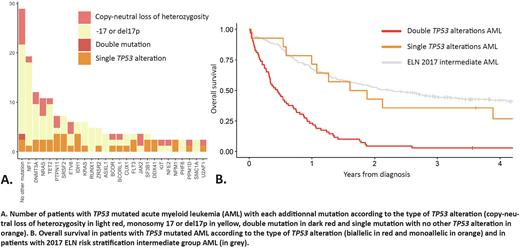Abstract
Introduction:TP53 is a key tumor suppressor gene involved in apoptotic pathways, metabolism functions, preservation of genomic balance and DNA repairs. TP53 locus is subject to mutations, deletions and copy-neural loss of heterozygosity. TP53 mutations are associated with a reduced overall survival and are assigned to the ELN 2017 adverse-risk group. Recent studies have suggested a worse prognostic impact of biallelic TP53 alterations compared to monoallelic TP53 mutations in myelodysplastic syndromes (Bernard et al, Nat. Medicine, 2020). Whether TP53 allelic state impairs the prognostic in intensively-treated acute myeloid leukemia (AML) patients and may refine the treatment strategy has not been addressed. Here, we analysed TP53 alterations in newly diagnosed AML patients (pts) from 3 prospective Acute Leukemia French Association (ALFA) trials.
Methods: A total of 983 adult AML pts enrolled in ALFA-0701 (NCT00927498), ALFA-0702 (NCT00932412) and ALFA-1200 (NCT01966497) trials were retrospectively screened for TP53 alterations by high throughput sequencing and conventional cytogenetics. Pts displaying at least two TP53 mutations or one TP53 mutation associated with either TP53 locus deletion or TP53 locus copy-neutral loss of heterozygosity (CN-LOH) were assigned as biallelic TP53 alteration patients. TP53 locus CN-LOH were approximated based on variant allele frequencies and copy number analysis. Survival was analysed with multivariate Cox models stratified on the trial.
Results: Eighty-three patients had TP53 mutations (8%; ALFA-0701: n=21, ALFA-0702: n=28; ALFA-1200: n=34), including 14 pts with monoallelic and 69 pts with biallelic TP53 alterations respectively. Median age of TP53 mutated patients was 62 years (IQR: 57-68). Leukocytes counts and bone marrow blast counts at diagnosis were lower in TP53 mutated patients (3.0 G/L vs. 8.7 G/L, p<0.0001; 40% vs. 58%, p=0.002, respectively). Median variant allele frequency of TP53 mutations was 43% (IQR: 21-69). As compared to TP53 wildtype AML, TP53 mutated pts more often harbored complex karyotype (n=69 (86%) vs n=51 (6%), p<0.0001) and monosomal karyotype (n=65 (81%) vs n=32 (4%), p<0.0001). The median number of additional mutations was 2 (IQR: 0-3). TP53 mutations were associated with mutations in signalling genes (NF1, NRAS, PTPN11, KRAS, FLT3, KIT and JAK2) in 33 pts (40%). Overall, 43 TP53 mutated AML patients (52%) achieved complete remission (CR)/complete remission without platelet recovery (CRp) after one or two courses of induction whereas 684 TP53-wt patients (76%) were in CR/CRp at that time (p<0.0001). TP53 mutations were associated with a significantly reduced OS and DFS in multivariate analysis including age and WBC count (2-year OS, 11% vs 56%, HR: 3.48, 95% CI: 2.71-4.47, p<0.0001; 2-year DFS, 12% vs 50%, HR: 2.97, 95% CI: 2.12-4.16, p<0.0001, respectively). Among TP53 mutated AML, biallelic TP53 alterations were associated with worse OS compared to monoallelic TP53 alterations (2-year OS, 4% vs 43%, HR: 4.13, 95% CI: 1.87-9.13, p=0.0004 in multivariate analysis accounting for age and WBC count). Interestingly, outcome of the 2017 ELN risk stratification intermediate group was not different to that of monoallelic TP53 pts (2-year OS, 43% for monoallelic TP53 pts vs 53%, HR: 1.07, 95% CI: 0.55-2.07, p=0.84). In pts with biallelic TP53 alterations, presence of signalling mutations was associated with a worse survival in a multivariate analysis accounting for age and WBC (HR: 1.82, 95% CI: 1.06-3.11, p=0.03).
Conclusion: Allelic status refines the prognostic value of TP53 mutations in AML. While monoallelic TP53 alterations display similar outcome to that of the ELN 2017 intermediate risk group, biallelic TP53 alterations dramatically impair patient outcome. Patients with biallelic TP53 alterations may be good candidates for new first-line treatment strategies.
Disclosures
Lambert:Astellas: Honoraria. Recher:Takeda: Membership on an entity's Board of Directors or advisory committees; AbbVie, Amgen, Novartis, BMS-Celgene, Jazz Pharmaceuticals, Agios, MaatPharma, Astellas, Roche, Iqvia, Daiichi-Sankyo: Research Funding; Servier: Consultancy, Honoraria, Membership on an entity's Board of Directors or advisory committees; Pfizer: Membership on an entity's Board of Directors or advisory committees; Novartis: Membership on an entity's Board of Directors or advisory committees; Jazz Pharmaceuticals: Consultancy, Honoraria, Membership on an entity's Board of Directors or advisory committees, Research Funding; AbbVie, Janssen, Jazz Pharmaceuticals, Novartis, BMS-Celgene, Otsuka, Astellas, Daiichi-Sankyo, Macrogenics, Roche, Takeda, Servier, Pfizer: Other: Advisory role; Astellas: Honoraria, Membership on an entity's Board of Directors or advisory committees, Research Funding; BMS: Consultancy, Honoraria, Membership on an entity's Board of Directors or advisory committees, Research Funding; AbbVie: Consultancy, Honoraria, Membership on an entity's Board of Directors or advisory committees, Research Funding; Amgen: Honoraria, Membership on an entity's Board of Directors or advisory committees, Research Funding. Dombret:Incyte: Honoraria; Servier: Honoraria.
Author notes
Asterisk with author names denotes non-ASH members.


This feature is available to Subscribers Only
Sign In or Create an Account Close Modal